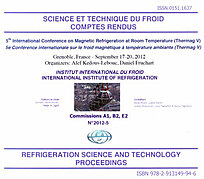
Document IIF
Systèmes magnétocaloriques régénératifs : un tour d'horizon des activités de recherche et de développement à l'Université de Victoria.
Regenerative magnetocaloric systems: an overview of research and development activities at the University of Victoria.
Numéro : sect. 1
Auteurs : TURA A., ROWE A., ARNOLD D. S., et al.
Résumé
The University of Victoria began research on magnetocaloric systems over two decades ago. While initially the interest was exclusively geared toward cryogenics and magnetic liquefiers, near room temperature testing demonstrated potential feasibility for more conventional applications such as air conditioning systems and refrigeration. Research activities in four main areas of active magnetic regenerator development are described: cryogenic applications, near room temperature permanent magnet devices, heat transport in regenerators, and theoretical models. The objective of the research group is to solve the system related challenges taking the technology to the path of commercialization. Heat transport research is focused on the study and characterization of the convective heat transfer, effective conductivity, and viscous losses in the regenerator matrix. The outlook is heat transfer optimization with minimal viscous losses and thermal axial conduction. Development of magnetocaloric systems is necessary for both model validation and dealing with the technological challenges involved with magnetic refrigerators. The objective here is active magnetic regenerator (AMR) characterization both in terms of magnetothermic and heat transfer properties, while progressing toward device commercialization. Finally numerical and analytical models hold the key to performance prediction, optimization, and thus, ultimately, AMR and magnet design. However, they do heavily rely on experimental validation, given the highly interdisciplinary nature of the physics involved, which are often described by semi-empirical correlations and tabulated experimental data.
Documents disponibles
Format PDF
Pages : 73-87
Disponible
Prix public
20 €
Prix membre*
Gratuit
* meilleur tarif applicable selon le type d'adhésion (voir le détail des avantages des adhésions individuelles et collectives)
Détails
- Titre original : Regenerative magnetocaloric systems: an overview of research and development activities at the University of Victoria.
- Identifiant de la fiche : 30005455
- Langues : Anglais
- Sujet : Technologie
- Source : 5th International Conference on Magnetic Refrigeration at Room Temperature (Thermag V). Proceedings: Grenoble, France, September 17-20, 2012.
- Date d'édition : 17/09/2012
Liens
Voir d'autres communications du même compte rendu (70)
Voir le compte rendu de la conférence
-
Numerical analysis of a linear reciprocating ac...
- Auteurs : NIELSEN K. K., BARBOSA J. R. Jr, TREVIZOLI P. V.
- Date : 23/08/2010
- Langues : Anglais
- Source : 4th International Conference on Magnetic Refrigeration at Room Temperature (Thermag IV). Proceedings: Baotou, China, August 23-27, 2010.
- Formats : PDF
Voir la fiche
-
Numerical modelling of graded active magnetic r...
- Auteurs : NIELSEN K. K., BAHL C. R. H., ENGELBRECHT K., et al.
- Date : 23/08/2010
- Langues : Anglais
- Source : 4th International Conference on Magnetic Refrigeration at Room Temperature (Thermag IV). Proceedings: Baotou, China, August 23-27, 2010.
- Formats : PDF
Voir la fiche
-
Potentials for the integration of magnetocalori...
- Auteurs : KITANOVSKI A., TUSEK J., POREDOS A.
- Date : 21/08/2011
- Langues : Anglais
- Source : Proceedings of the 23rd IIR International Congress of Refrigeration: Prague, Czech Republic, August 21-26, 2011. Overarching theme: Refrigeration for Sustainable Development.
- Formats : PDF
Voir la fiche
-
A numerical analysis of an active magnetic mult...
- Auteurs : APREA C., GRECO A., MAIORINO A.
- Date : 10/06/2011
- Langues : Anglais
- Source : Green new deal - green economy. The latest technology in refrigeration and air conditioning: energy issues and climate change, new refrigerants, new European regulations, new plants. XIV European Conference: June 10-11, 2011, Milan.
- Formats : PDF
Voir la fiche
-
Un’analisi numerica di un refrigeratore magneti...
- Auteurs : APREA C., GRECO A., MAIORINO A.
- Date : 10/06/2011
- Langues : Italien
- Source : Green new deal - green economy. The latest technology in refrigeration and air conditioning: energy issues and climate change, new refrigerants, new European regulations, new plants. XIV European Conference: June 10-11, 2011, Milan.
- Formats : PDF
Voir la fiche
